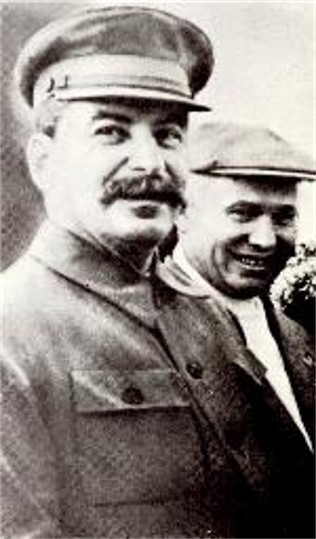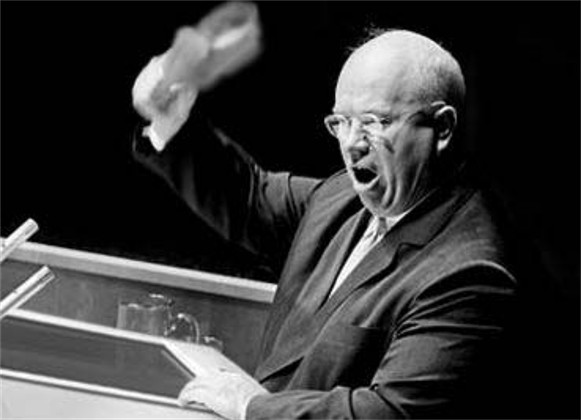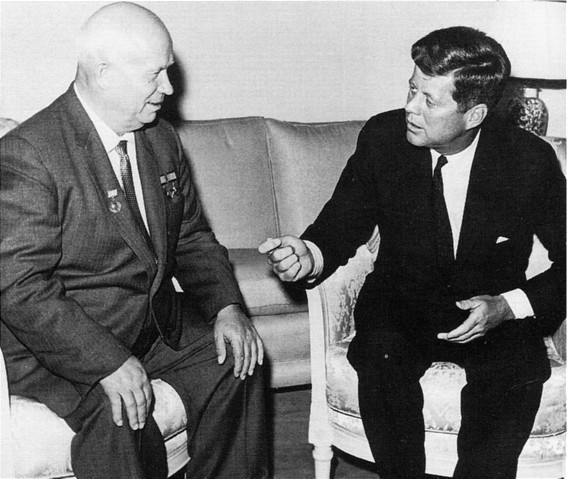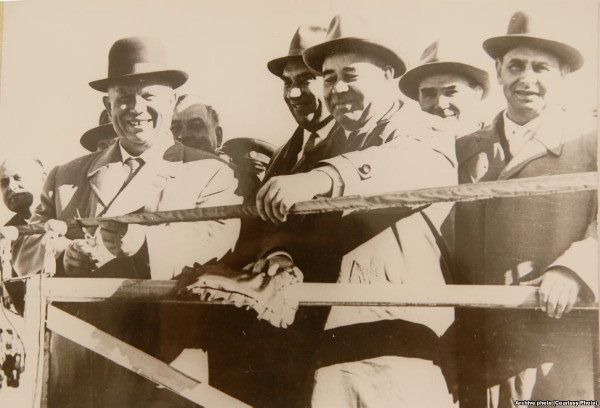Khrushchev, Nikita
Khrushchev, Nikita [ Russian: Хрущев, Никита; Xruščev], b 17 April 1894 in Kalinovka, Kursk gubernia, Russia, d 11 September 1971 in Moscow. Soviet political leader, first secretary of the Communist Party of the Soviet Union, and premier of the USSR. Joining the Russian Communist Party (Bolshevik) in 1918 and the Red Army in 1919, he rose through the Party ranks to become a member of the CC by 1934. As head of the Moscow Party organization, he served Joseph Stalin zealously during the purges of the 1930s. From 1938 to 1949, except for nine months in 1947, he was first secretary of the CC CP(B)U. He presided over the forced introduction of Russian into Ukrainian schools, and the final year of the bloody purges known as the Yezhov terror, in which thousands of Ukrainians, including Party members, were executed or imprisoned. In 1939 he was rewarded for these achievements with a seat on the Presidium. Under his secretaryship Galicia and Volhynia (1939), and then Bukovyna (1940), were incorporated into the Ukrainian SSR, and their inhabitants were subjected to repression and terror for two years. After the war his primary task was to restore agricultural production in Ukraine and to rebuild its industry as quickly as possible. At the same time he launched a propaganda campaign against Ukrainian nationalism and a military assault against pockets of resistance of the Ukrainian Insurgent Army. Writers and artists who dwelled on Ukraine's history or were influenced by European cultural currents came under severe criticism. Hundreds of Ukrainian intellectuals, including distinguished writers such as Maksym Rylsky, Volodymyr Sosiura, and Ostap Vyshnia, were persecuted.
After Joseph Stalin's death Khrushchev emerged victorious from a power struggle with G. Malenkov. On 25 February 1956 Khrushchev launched his de-Stalinization campaign with a secret speech to the 20th Party Congress in Moscow. His denunciation of Stalin's brutality, abuses of power, deportation of ethnic minorities, and mass terror had far-reaching effects. It not only led to a restriction of the powers of the secret police, greater freedom of expression, the release of thousands of political prisoners, and the ‘rehabilitation’ of some of the terror's victims, but also destroyed the cult of personality and faith in the Party's infallibility.
In 1958 Khrushchev unveiled his new seven-year plan (see Economic planning), promising to overtake the United States in economic performance. Educational reforms were introduced to meet the demands of the new economic program. To Russify Ukraine's educational system, parents were allowed to choose their child's language of instruction in school, and Ukrainian was no longer a required subject in schools using Russian as the language of instruction. Khrushchev denied the need for languages other than Russian in scientific and technical fields. His ambitious agricultural plans, which opened up vast tracts of virgin land to cultivation, failed to achieve their production goals. A new scheme of industrial regionalization and a restructuring of the Party into industrial and agricultural sectors caused confusion and resentment. Reversing his policy of liberalization, in 1962 Khrushchev began to criticize writers, artists, and intellectuals for ‘abstractionism,’ ‘modernism,’ and ‘formalism.’ In Ukraine the shistdesiatnyky, particularly Ivan Dziuba, Yevhen Sverstiuk, and Ivan Svitlychny, came under increasing attack. He also initiated an intense antireligious campaign (1959–64), during which half of Ukraine's Orthodox churches (almost 7,000 in 1959 alone) were closed.
His frequent policy shifts and arbitrary administrative methods cost him the support of many Party and government officials, while the quarrel with China and the failures in agriculture led to widespread disillusionment among the people. Khrushchev's opponents steadily consolidated their power and in October 1964 ousted him from office. Confined to his dacha outside Moscow, he wrote his memoirs, which were smuggled to the West and published in two volumes entitled Khrushchev Remembers (1970, 1974).
BIBLIOGRAPHY
Maistrenko, I. Istoriia Komunistychnoï partiï Ukraïny (Munich 1979)
Lewytzkyj, B. Politics and Society in Soviet Ukraine 1953–1980 (Edmonton 1984)
Krawchenko, B. Social Change and National Consciousness in Twentieth-Century Ukraine (Oxford 1985)
Marko Robert Stech
[This article originally appeared in the Encyclopedia of Ukraine, vol. 2 (1988).]




